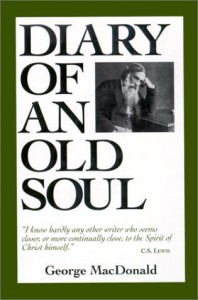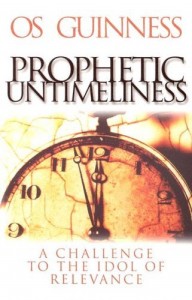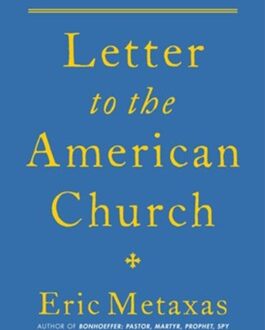Diary of an Old Soul
 I’ve been revisiting George MacDonald lately. I knew him first as the one whose Phantastes C.S. Lewis credited with “baptizing his imagination.” Then I explored some of his children’s books, and more recently a Gothic romance. Slowly I’ve been accumulating impressions and experiences of this writer.
I’ve been revisiting George MacDonald lately. I knew him first as the one whose Phantastes C.S. Lewis credited with “baptizing his imagination.” Then I explored some of his children’s books, and more recently a Gothic romance. Slowly I’ve been accumulating impressions and experiences of this writer.
I didn’t realize that he was also a well-respected poet, and frequently a guest lecturer on poetry. This week I learned that MacDonald was an admirer of Browning, an acquaintance of Tennyson, and such a fan of Coleridge that he made The Rime of the Ancient Mariner the subject of a chapter in his book There and Back. He published several volumes of poetry, including A Book of Strife in the form of The Diary of an Old Soul, published as 366 seven-line poems in 1880. “No stranger to hardship,” notes Robert Trexler in the introduction,
MacDonald suffered from emphysema, eczema, bouts of depression, and poverty throughout his long life. Several times poor health placed him at the point of death. His mother died when he was ten and his two closest brothers died as young men. He outlived 4 of his 11 children, 2 of whom died in 1878 and 1879, the period just before the publication of these daily poems. Readers of MacDonald’s books, filled as they are with hope and optimism, might be surprised to learn of the many tests of faith God permitted in his life.
Diary of an Old Soul contains a 7-line poem for each day of the year. Most of them are reflective, devotional pieces that probe all corners of his spiritual life. Many are prayers. Opposite each page is supposed to be a white page for the reader to write their own response, as the first poem explains:
Sweet friends, receive my offering. You will find
Against each worded page a white page set: –
This is the mirror of each friendly mind
Reflecting that. In this book we are met.
Make it, dear hearts, of worth to you indeed: –
Let your white page be ground, my print be seed,
Growing to golden ears, that faith and hope shall feed.YOUR OLD SOUL
The best way to get acquainted with the book is on these terms, I think. Mine is a library copy, though, so instead of accompanying MacDonald on a journey that unfolds in small steps over a year, I’ve been browsing through the poems — gorging myself, in effect. (It’s not ideal, but maybe I can redeem it at some point with an original poem about late fees…?)
Truth is, they don’t lend themselves to gorging. But here are a few samples that give their flavor, with minimal commentary from Yours Truly.
August 21
Thou being in me, in my deepest me,
Through all the time I do not think of thee,
Shall I not grow at last so true within
As to forget thee and yet never sin?
Shall I not walk the loud world’s busy way,
Yet in thy palace-porch sit all the day?
Not conscious think of thee, yet never from thee stray?
Several lines of speculation emerge: maturity in love for God; the role of consciousness and the “deepest me” of the unconscious; the innerness of spiritual transformation. In the end, the poem suggests, we’re changed not by having lots of consciously religious thoughts, but by the quiet work of God within.
December 26
We all are lonely, Maker — each a soul
Shut in by itself, a sundered atom of thee.
No two yet loved themselves into a whole;
Even when we weep together we are two.
Of two to make one, which yet two shall be,
Is thy creation’s problem, deep, and true,
To which thou only holds the happy, hurting clue.
There’s no trite wind-up, just an acknowledgment of loneliness against a backdrop of faith. MacDonald uses reflection to acknowledge the limits of reflection.
Strangely, though, the overall effect of these poems is to ease loneliness. Here is an author who, as 19th-century scholar Vida Dutton Scudder points out, “makes less solitary the inmost recesses of the spiritual life.” Each of these poems is a microscope trained on some current of thought or feeling. In their quietness they illuminate, and accord a gentleness to, the moments of insight that add up to the diary of a soul.


